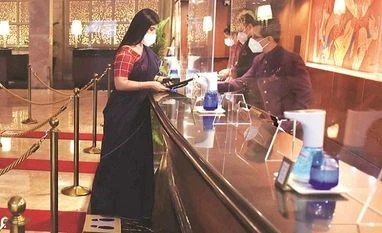The Reserve Bank of India (RBI) on September 7, under the ambit of the Kamath Committee, allowed corporates to avail of loan restructuring for a period of two years, limited to debt distressed solely due to the pandemic. However, the fate of hotel owners with high debt pile continues to hang in balance.
Thee parameters set by the committee include total outside liabilities to the adjusted tangible net worth (TOL/ATNW), current ratio, total debt/Ebitda, average debt service coverage ratio, and debt service coverage ratio.
Industry executives said the qualifying benchmarks would benefit only a few hotels, pointing that it was now up to the RBI and individual banks to favourably review deserving cases.
“Unfortunately, the Committee recommendations in terms of qualifying benchmarks have not been favourable for most hotel companies,” said Vineet Verma, executive director and chief executive at Bridget Hospitality.
K B Kachru, vice-president of Hotel Association of India, said the industry appreciated that the committee took cognizance of the stress facing the sector. “Majority of the hotel owners are not eligible for loan restructuring due to the stringent financial ratios. It is not helping those in distress.”
The panel, however, clarified that the financial ratios would be applicable prospectively and not retrospectively. “This has been clarified to banks,” said a panel member. This has been done taking into consideration the severe impact of the pandemic on sectors like aviation and hospitality and the long road to recovery ahead of them, he said.
Some welcomed the clarification, pointing out that it expands the number of companies that can now benefit from restructuring. It means it makes even those hotels that have come up in the past one year, eligible. Others said the plan doesn’t make much difference as hotel business and cash flows are not expected to really improve to sustainable levels at least till the end of next year.
According to rating agency ICRA’s estimates, hospitality entities in the BBB and below rating categories would require more loan restructuring support. For a bulk of these companies, to meet the requisite criteria by March 31, 2022, they would have to achieve higher financial metrics than the pre-Covid level, a stretched target within a period of two years. Hence, the benchmark cut-offs and more importantly the limited time-frame to achieve these parameters may take these entities out of the eligibility bucket.
“The resolution framework, in its current form is unlikely to provide the much-needed succour to the weaker players in the hospitality industry,” said Pavethra Ponniah, vice-president and sector head at ICRA in a report this week.
Even during the decadal high of FY19 for the sector, industry aggregates failed to meet some benchmarks, notably on total debt/OPBDITA (operating profit before depreciation, interest and tax and ammortisation), she said.
To read the full story, Subscribe Now at just Rs 249 a month
Already a subscriber? Log in
Subscribe To BS Premium
₹249
Renews automatically
₹1699₹1999
Opt for auto renewal and save Rs. 300 Renews automatically
₹1999
What you get on BS Premium?
-
Unlock 30+ premium stories daily hand-picked by our editors, across devices on browser and app.
-
Pick your 5 favourite companies, get a daily email with all news updates on them.
Full access to our intuitive epaper - clip, save, share articles from any device; newspaper archives from 2006.
Preferential invites to Business Standard events.
Curated newsletters on markets, personal finance, policy & politics, start-ups, technology, and more.
Need More Information - write to us at assist@bsmail.in
)